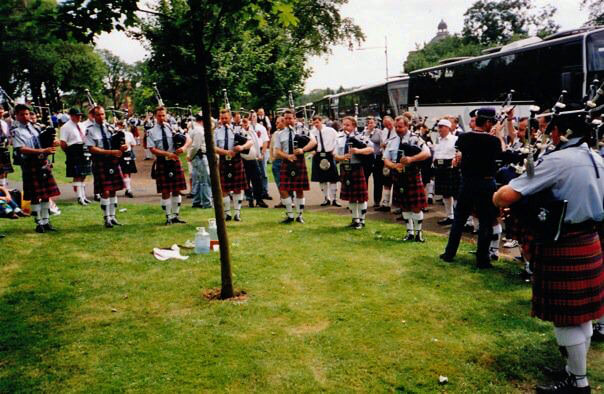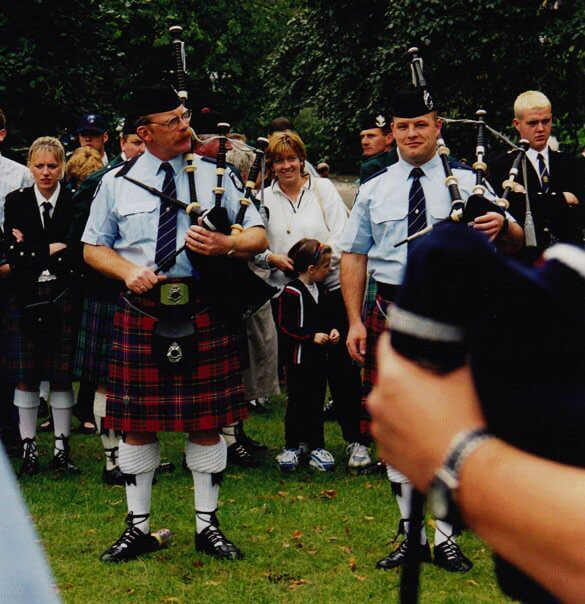Down under, up and over: the Victoria Police World’s win 20 years later
That sound: technology, analytical strategy, and The Drone Police
The 1990s saw profound changes in piping and drumming. Synthetic reeds were coming onto the market, artificial pipe bags started to emerge in quantity, and the first moisture control systems were introduced. Remarkably and perhaps surprisingly, many of these ingenuities were coming from Australia, driven by people like Blair and Geoff Ross, with the Victoria Police keen to test and perfect the products.

The innovations turned out to provide a distinct advantage. Victoria Police were taking control of the pipes, utilizing technology to gain a consistency of sound never before heard. Directly related to the band’s use of new tuning concepts and stability products, 1996-’98 were watershed years in pipe history.
When previously the pipe-major would tune individual sets of drones one-by-one, while everyone else awaited their turn, drones powered by synthetic Ross reeds and stabilized with the Ross canister moisture control system could be tuned with precision while the band was playing. It’s standard practice now, but Victoria Police perfected it to an analytical art.
“The band was lucky to have two great sound guys in Robert Crozier and Ross Bates, who worked well and were very analytical,” Melvin observes. “We also had a good connection with Geoff Ross, who manufactured the synthetic pipe bags and drone reeds that the band played. Use of this new technology gave the band an edge and slightly different sound. Ross and Robert also developed a good methodical way of tuning the band up, and having it very ordered. We were also very lucky to have David McNamara and Allan Leggett to be our drone tuning team, and they were amazingly quick and accurate. I remember certain pipe-majors of other Grade 1 bands coming to practice to see how we sounded and what we did. It seemed to be a pivotal moment that other bands felt they had to reassess what they did to compete against us.”
 “It was efficient for the entire band to be playing while the drones were being tuned,” Crozier says. “Apart from taking periodic pitch readings from my pipes prior to tuning drones, two drone tuners took all that responsibility away from myself to focus on tuning chanters. One day as part of a joke they had the words ‘Drone Police’ stenciled on the back of their t-shirts, and the name has stuck with them ever since.”
“It was efficient for the entire band to be playing while the drones were being tuned,” Crozier says. “Apart from taking periodic pitch readings from my pipes prior to tuning drones, two drone tuners took all that responsibility away from myself to focus on tuning chanters. One day as part of a joke they had the words ‘Drone Police’ stenciled on the back of their t-shirts, and the name has stuck with them ever since.”
While stability was leveraged by the use of synthetic materials and technology, the band created a warmer sound with blackwood Sinclair chanters, the same instruments used by the Strathclyde Police and 78th Fraser Highlanders during their heydays in the 1980s and early-1990s. The Sinclairs were harder to manage than emerging plastic instruments, but worth the effort.

“Within a year in Grade 1, we changed to Sinclair blackwood chanters,” Lyons says. “It was, more than anything, sticking to and perfecting what we had. We weren’t continually searching for a magic remedy or combination, or trying to copy what the other top bands were doing. We stuck with it and developed our own signature sound, which, to this day would stand up in the Grade 1 arena. One-to-one detailed precision tuning was a huge factor along with a regimented tune-up procedure.”
Relatively speaking, a more-loosely-set tone had been good enough until then. The virtually unblemished tuning that we hear and expect today from the world’s elite pipe bands could be seen to have started with the Victoria Police.
“I recall the Vic Police being overdue after a very good performance in 1997,” remembers Terry Lee, at the time pipe-major of the rival Simon Fraser University Pipe Band, who had beaten them the year before on ensemble preference. “Many felt they were hard done by. Not sure whether they were, or not, but knew they would be a determined bunch in ’98, which they were. A clinical sound was their trademark, but they delivered a clinical performance that day as well. There was no doubt which way it would go at the end of that day.”
In fact, according to some in the band, the results had been leaked by RSPBA officials, so they knew that they had won, even though their performances on the day had left little doubt.
“Sure, our set-up and sound were different to the rest,” Fuller observed, “which provided a level of stability and duration of play that wasn’t usually possible in those days. But the skills of the ‘sound men’ can’t be overlooked. They were right on the money, always, and the band had exceptionally steady players with really clean and accurate fingers, which is essential when your sound starts to refine to that point. It’s also handy when some of the people who played a hand in designing our equipment were also tuning the band.”

NO COMMENTS YET